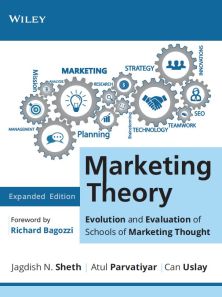Marketing Theory: Evolution and Evaluation of Schools of Marketing Thought
ISBN: 9789354641206
For more information write to us at: acadmktg@wiley.com

Description
The discipline of marketing has grown exponentially in recent years. Its evolution over the past century is both fascinating and impressive. Along this journey, many schools of marketing thought emerged and enriched the discipline. However, several of these schools of thought are now a part of the history books. Yet, others have morphed into new schools of thought shaped by the changing marketing context and the emergence of digital technology. This is a must-read book for doctoral students in marketing, and young scholars and practitioners who would like to learn about the rationale and theoretical tenets of the various schools of marketing thought and how they contributed to the contemporary and current premise for developing marketing theory.
Preface
Acknowledgements
About the Authors
Prologue
Chapter 1 Introduction
1.1 Resurgence of Interest in Marketing Theory
1.2 The Era of Turbulent Transition
1.3 Framework for the Book
1.4 Metatheory Criteria for the Evaluation of Theories
Chapter 2 Non-Interactive Economic Schools of Marketing
2.1 The Commodity School of Thought
2.2 The Functional School of Thought
2.3 The Regional School of Thought
Chapter 3 Interactive Economic Schools of Marketing
3.1 The Institutional School of Thought
3.2 The Functionalist School of Thought
3.3 The Managerial School of Thought
Chapter 4 Non-Interactive - Non-Economic Schools of Marketing
4.1 The Buyer Behavior School of Thought
4.2 The Activist School of Thought
4.3 The Macromarketing School of Thought
Chapter 5 Interactive-Non-Economic Schools of Marketing
5.1 The Organizational Dynamics School of Thought
5.2 The Systems School of Thought
5.3 The Social Exchange School of Thought
Chapter 6 What We Have Learned
6.1 Is Marketing a Science or, at Best, a Standardized Art?
6.2 What Is, or Should Be, the Proper Domain of Marketing Theory?
6.3 What Is, or Should Be, the Dominant Perspective in Marketing?
6.4 What Is, or Should Be, the Relationship Between Marketing and Society?
6.5 Is It Really Possible to Create a General Theory of Marketing?
Chapter 7 Marketing Strategy School of Thought
7.1 Introduction
7.2 Growth and Challenges of Marketing Strategy School of Thought
7.3 Confusion Regarding the Domain and Taxonomy of Marketing Strategy
7.4 Evolution of Marketing Strategy School of Thought
7.5 New Frontiers of Research in Marketing Strategy
7.6 Evaluation of Marketing Strategy School
Chapter 8 International Marketing School of Thought
8.1 Introduction
8.2 To Standardize or Localize, that is the Question
8.3 Country of Origin Effects
8.4 Market Attractiveness
8.5 Market Selection and Entry Mode
8.6 Global Branding
8.7 Cross-Cultural Research
8.8 Chindia and the Global Rule of Three
8.9 Evaluation of the International Marketing School
Chapter 9 Services Marketing School of Thought
9.1 Introduction
9.2 SERVQUAL
9.3 The Nordic School of Services
9.4 Service-Dominant (S-D) Logic of Marketing
9.5 Beyond SERVQUAL and S-D Logic
9.5.3 Eras and Evolving Focus of Services Research
9.6 Concluding Remarks 1
9.7 Evaluation of the Services Marketing School
Chapter 10 Relationship Marketing School of Thought
10.1 Introduction
10.2 Why Did Relationship Marketing Rise?
10.3 Foundations of Relationship Marketing Theory
10.4 Elevation of Relationship Marketing within Marketing Discipline and by the AMA
10.5 RM’s Identity Crisis and Relegation to a Marketing Type by AMA
10.6 Can Relationship Marketing Become the Foundation of a General Theory of Marketing?
10.7 Revitalizing RM School
10.8 Evaluation of Relationship Marketing School of Thought
Summary
Questions for Analysis and Discussion
Epilogue
References
Index

